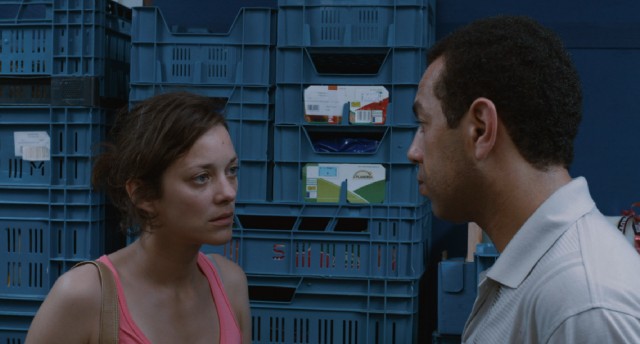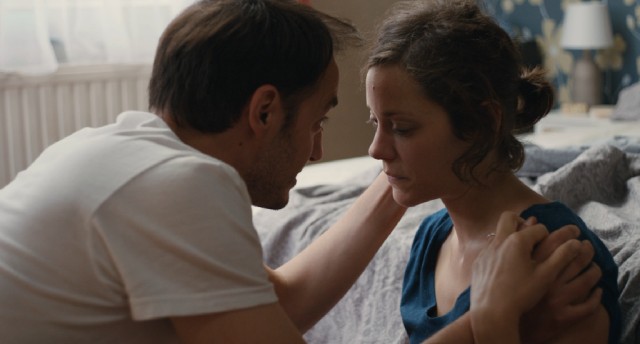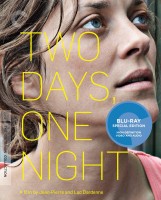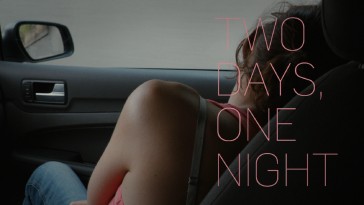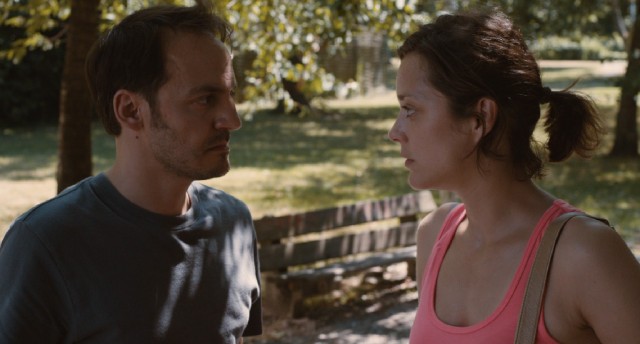Two Days, One Night: The Criterion Collection Blu-ray Review
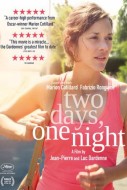 |
Two Days, One Night (Deux Jours, Une Nuit)
US Theatrical Release: December 24, 2014 (Belgium: May 21, 2014) / Running Time: 95 Minutes / Rating: PG-13 Writers/Directors: Jean-Pierre Dardenne, Luc Dardenne Cast: Marion Cotillard (Sandra Bya), Fabrizio Rongione (Manu Bya), Catherine Salée (Juliette), Batiste Sornin (Mr. Dumont), Pili Groyne (Estelle Bya), Simon Caudry (Maxine Bya), Lara Persain (Willy's Wife), Alain Eloy (Willy), Myriem Akeddiou (Mireille), Fabienne Sciascia (Nadine), Anette Niro (Grandmother), Rania Mellouli (Timur's Daughter), Christelle Delbrouck (Barwoman), Timur Magomedgadzhiev (Timur), Hassaba Halibi (Hicham's Wife), Soufiane Jilal (Maghrebian Cashier), Hicham Slaoui (Hicham), Philippe Jeusette (Yvon), Yohan Zimmer (Jérôme), Safia Gollas (Jérôme's Girlfriend), Christelle Cornil (Anne), Marion Lory (Julien's Wife), Angélique Michaux (Baker), Laurent Caron (Julien Lemmens), Joachim Vincent (Ryan), Donovan Deroulez (Anne's Husband), Tom Adjibi (Doctor), Elena Doratiotto (Nurse), Franck Laisné (Dominique), Maïdy Ankaye (Alphonse's Sister), Alao Kasongo (Alphonse's Mother), Serge Koto (Alphonse), Morgan Marinne (Charly), Gianni La Rocca (Robert), Ben Hamidou (Kader), Carl Jadot (Miguel), Olivier Gourmet (Jean-Marc), Sabine Raskin (Solwal Secretary) |
Buy Two Days, One Night from Amazon.com: Blu-ray • DVD • Instant Video
Two Days, One Night became one of the rare foreign movies to compete for something other than Best Foreign Language Film at the Academy Awards. Here, Cotillard plays Sandra Bya, a Belgian wife and mother of two who after missing time at work for an illness has just been laid off. The film slowly makes clear Sandra's situation to us. Encouraged by her husband Manu (Fabrizio Rongione) and friend/co-worker Juliette (Catherine Salée), Sandra races to her former workplace to potentially undo her firing. Her higher-up, Mr. Dumont (Batiste Sornin), agrees to let the sixteen other people in Sandra's department revote this coming Monday morning on the issue. Asked to choose between keeping their annual 1,000 Euro bonus or keeping Sandra employed, fourteen of the sixteen voted to let her go. Word is they were unjustly influenced by their foreman, who misled some of them to believe they would be fired if Sandra wasn't.
This potential reprieve prompts Sandra to swallow her pride and fight for the job her family needs her to keep. She plans to spend the weekend visiting each of her sixteen co-workers in an effort to persuade them to reconsider her employment. It's an unenviable task that clearly weighs heavily on Sandra. She does not want to come across as a beggar, but she also does not want to be unemployed.
Fueled by the antidepressant Xanax, Sandra sets out on this exercise, her face-to-face pleas striking us as heartfelt and meaningful in this age of casual text-based communications. Showing up unannounced, Sandra finds many of her co-workers are out doing something else. She makes the same direct, impassioned case to each she tracks down. Everyone has their reasons for needing the extra thousand Euros, from home renovations to their children. At the same time, everyone wants to know who else has been persuaded to side with Sandra. A thousand Euros starts to seem insignificant when judged against their co-worker's employment (and possibly, her sanity).
The topic is not taken lightly by anyone. Sandra's request sparks a fistfight, breaks up a marriage, and even leads to a suicide attempt. Meanwhile, as more people agree to vote to retain Sandra even if it means surrendering their bonus, some hope creeps into her plight of desperation.
Two Days, One Night plays quite a bit like 12 Angry Men, only instead of having to get a stuffy jury room of strangers to reconsider their vote in a trial verdict, Sandra is out and about trying to persuade her workmates to save her factory job.
Written and directed by brothers Jean-Pierre and Luc Dardenne (The Kid with a Bike, L'enfant), the film is sunny, contemporary, fictional, and apolitical, qualities that Oscar contenders in both the Foreign Language Film and Lead Actress categories rarely possess. It is an appealing, universal, and supremely involving human tale.
At its center is a character we know little about but care for deeply. We never know what specific (presumably depression-related) ailment kept Sandra out of work or learn why this job is so important to her. In passing, we gather that she is working for some kind of solar paneling company, but we never see her or her workmates actually working. Cotillard, who impresses to an even greater degree than usual, failed to repeat her 2007 Best Actress win for La Vie en Rose, losing to four-time bridesmaid Julianne Moore. Though doing most of its business after the Academy Award nominations were announced, Christmas Eve opener Two Days remained a much smaller draw than its English language competition, while also grossing less in North America than Foreign Language winner Ida and nominee Wild Tales. The movie nonetheless receives an honor significant in its own right, by getting admitted into The Criterion Collection via this week's Blu-ray and DVD debuts bearing spine number 771.
VIDEO and AUDIO Criterion routinely makes old movies look new, so it's little surprise that Two Days, One Night, which was playing in theaters just a few months ago, looks exquisite on Blu-ray. The 1.85:1 transfer shows off the film's sunny, vibrant visuals without even the tiniest of imperfections, while the 5.1 DTS-HD master audio French soundtrack presents the unscored film's dialogue with care. English subtitles provide an impeccable translation.
BONUS FEATURES, MENUS, PACKAGING and DESIGN The Blu-ray's all-HD extras begin with Criterion's long interview (51:04) of writers-directors Jean-Pierre and Luc Dardenne. Next, we get an interview (22:19) of actors Marion Cotillard and Fabrizio Rongione. Recorded separately but edited together, Cotillard speaks in English, while Rongione uses French. They talk about their characters, their process, and their experiences working with the Dardennes. "On Location" (36:47) returns the Dardenne brothers to the production's Belgian filming sites, their visits sharing the screen or being compared to the corresponding film scene, which they reflect upon. It's the kind of featurette that would be appreciated more with greater distance between the filming and the returns.
When Léon M.'s Boat Went Down the Meuse for the First Time (38:18) is a 1979 black and white documentary directed by the Dardenne brothers. It tells of the labor strike that crippled Belgium in the 1960s. It's not terribly interesting, but you can see seeds of the style they apply to Two Days. "The Dardennes on Léon M.'s Boat" (20:44) gathers the filmmakers' thoughts on their earlier work, particularly the documentary I just discussed. "To Be an I" (8:32) is a new video essay from film critic Kent Jones celebrating Two Days and other Dardenne movies, The on-disc extras conclude with the film's US theatrical trailer (1:53) IFC Films imprint Sundance Selects. The static, silent main menu settles on a shot of Sandra in a car. As always, Criterion authors the Blu-ray to support bookmarks and to resume playback wherever you left off. As with any Criterion release, the final inclusion is found inside the clear keepcase. The insert booklet folds open to twelve pages, half of which are dedicated to "Economics is Emotion", a new essay from film professor and blogger Girish Shambu. It focuses largely on capitalism and neoliberalism, paying consideration to what this and other Dardenne films say about the world around them while also touching upon topics such as color and costume you might not have noticed. Outside of two that go to a full-color film still, the remaining pages are devoted to film and disc information.
CLOSING THOUGHTS Two Days, One Night is the kind of foreign film that people who don't really care for foreign films should thoroughly enjoy. This human drama demands no familiarity with or fondness for Belgium or the working class, just a genuine sympathy for human beings facing a tricky, realistic dilemma specific to today. Criterion does not disappoint with this Blu-ray release, which adds well over two hours of extras to a wonderful feature presentation. The interviews and bonus documentary will do more for established fans of the Dardennes than newbies, but the fine movie should appeal to all. Buy Two Days, One Night from Amazon.com: Blu-ray / DVD / Instant Video
|
Related Reviews:
DVDizzy.com | DVD and Blu-ray Reviews | New and Upcoming DVD & Blu-ray Schedule | Upcoming Cover Art | Search This Site
DVDizzy.com Top Stories:
Marion Cotillard: The Immigrant • Rust and Bone • Midnight in Paris • Contagion • The Dark Knight Rises • Nine
Best Actress Nominees: Still Alice • The Theory of Everything • Gone Girl
Foreign Language Films: Wild Tales • Leviathan • Amour • The Intouchables • The Lunchbox
New to Blu-ray: Strangerland • A Little Chaos • Madame Bovary • Guess Who's Coming to Dinner • Citizenfour • The Black Stallion
Text copyright 2015 DVDizzy.com. Images copyright 2014 Sundance Selects and 2015 The Criterion Collection, Metro-Goldwyn-Mayer. Unauthorized reproduction prohibited.
